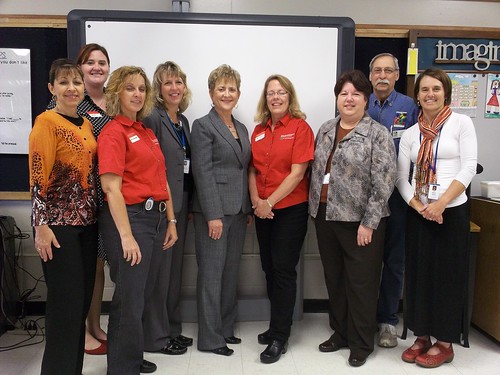It may look like just another lunch at Hiawatha Elementary School in Cedar Rapids, Iowa, but these children are part of The People’s Garden School Pilot Project. The students at Hiawatha Elementary are among 4,000 youth in 57 schools in Iowa, Arkansas, New York, and Washington participating in Healthy Gardens, Healthy Youth (HGHY), a project that will assess how school gardens influence students’ fruit and vegetable consumption.
The visit to Hiawatha was preceded by my participation in the Iowa Hunger Summit where we discussed steps to eliminate food insecurity in Iowa communities. What many people may not know is that hunger is fueled by poor nutrition. That’s why it’s so important that we focus both on promoting access to nutrition programs and greater access to a variety of fruits and vegetables. The school pilot projects are just one way we are accomplishing the latter.

During my visit, I was able to observe a key part of the pilot projects—children having their lunch trays photographed before and after eating. These photographs will be used to analyze what the children are actually choosing in lunch line and eating and how their eating habits may change based on having access to gardening and garden-based learning.
This fall, the HGHY team is collecting the baseline data from all 57 schools. Then in the spring half of the schools will plant gardens, becoming intervention schools, and the other half will remain control schools, planting their gardens once the research project concludes in spring 2013. Data will be collected from all schools participating in the project throughout the study. This will allow the research team to compare how fruit and vegetable choice and consumption changes from the baseline level, both for youth who are gardening and for those who are not.
The HGHY program is designed around the expertise available in each and every community through their land-grant university and their local Cooperative Extension programs including:
- Youth development expertise, to carry learning beyond the classroom, and help students take ownership of their gardens from planning to harvest.
- Master Gardeners that connect students and their gardens to trained community volunteers, providing expertise as well as intergenerational experiences.
- Nutrition and food safety education in the classroom and in after school programs, helping families learn to clean and prepare fresh and healthy foods on a budget, and providing foodservice personnel with advice in preparing fresh fruits and vegetables.
- Facilitating connections between schools and local food producers to bring fresh produce to schools while stimulating the local economy.
Cooperative Extension and schools will have to rely on their partnership to accomplish their goal. Ultimately, through Cooperative Extension, Healthy Garden Healthy Youth will build capacity and engage entire communities to sustain their local school gardens. From teachers and parents, to local business, organizations and volunteers, everyone can participate in growing healthy children.
Leadership for Healthy Gardens, Healthy Youth is provided by Washington State University Extension, in collaboration with the Cooperative Extensions of Cornell University, Iowa State University and University of Arkansas.
